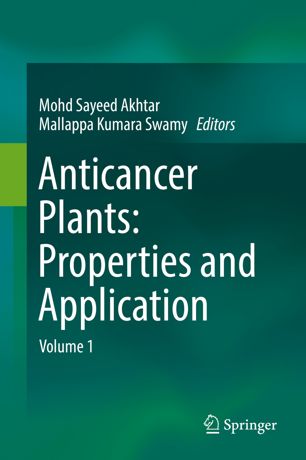

Most ebook files are in PDF format, so you can easily read them using various software such as Foxit Reader or directly on the Google Chrome browser.
Some ebook files are released by publishers in other formats such as .awz, .mobi, .epub, .fb2, etc. You may need to install specific software to read these formats on mobile/PC, such as Calibre.
Please read the tutorial at this link: https://ebookbell.com/faq
We offer FREE conversion to the popular formats you request; however, this may take some time. Therefore, right after payment, please email us, and we will try to provide the service as quickly as possible.
For some exceptional file formats or broken links (if any), please refrain from opening any disputes. Instead, email us first, and we will try to assist within a maximum of 6 hours.
EbookBell Team

4.4
102 reviewsCancer is one of the leading death cause of human population increasingly seen in recent times. Plants have been used for medicinal purposes since immemorial times. Though, several synthetic medicines are useful in treating cancer, they are inefficient and unsafe. However, plants have proved to be useful in cancer cure. Moreover, natural compounds from plants and their derivatives are safe and effective in treatment and management of several cancer types.
The anticancer plants such as Catharanthus roseus, Podophyllum peltatum, Taxus brevifolia, Camptotheca acuminate, Andrographis paniculata, Crateva nurvala, Croton tonkinensis, Oplopanax horridus etc., are important source of chemotherapeutic compounds. These plants have proven their significance in the treatment of cancer and various other infectious diseases. Nowadays, several well-known anticancer compounds such as taxol, podophyllotoxins, camptothecin, vinblastine, vincristine, homoharringtonine etc. have been isolated and purified from these medicinal plants. Many of them are used effectively to combat cancer and other related diseases. The herbal medicine and their products are the most suitable and safe to be used as an alternative medicine. Based on their traditional uses and experimental evidences, the anticancer products or compounds are isolated or extracted from the medicinally important plants. Many of these anticancer plants have become endangered due to ruthless harvesting in nature. Hence, there is a need to conserve these species and to propagate them in large scale using plant tissue culture. Alternatively, plant cell tissue and organ culture biotechnology can be adopted to produce these anticancer compounds without cultivation. The proper knowledge and exploration of these isolated molecules or products could provide an alternative source to reduce cancer risk, anti-tumorigenic properties, and suppression of carcinogen activities.
Anticancer plants: Volume 1, Properties and Application is a very tim